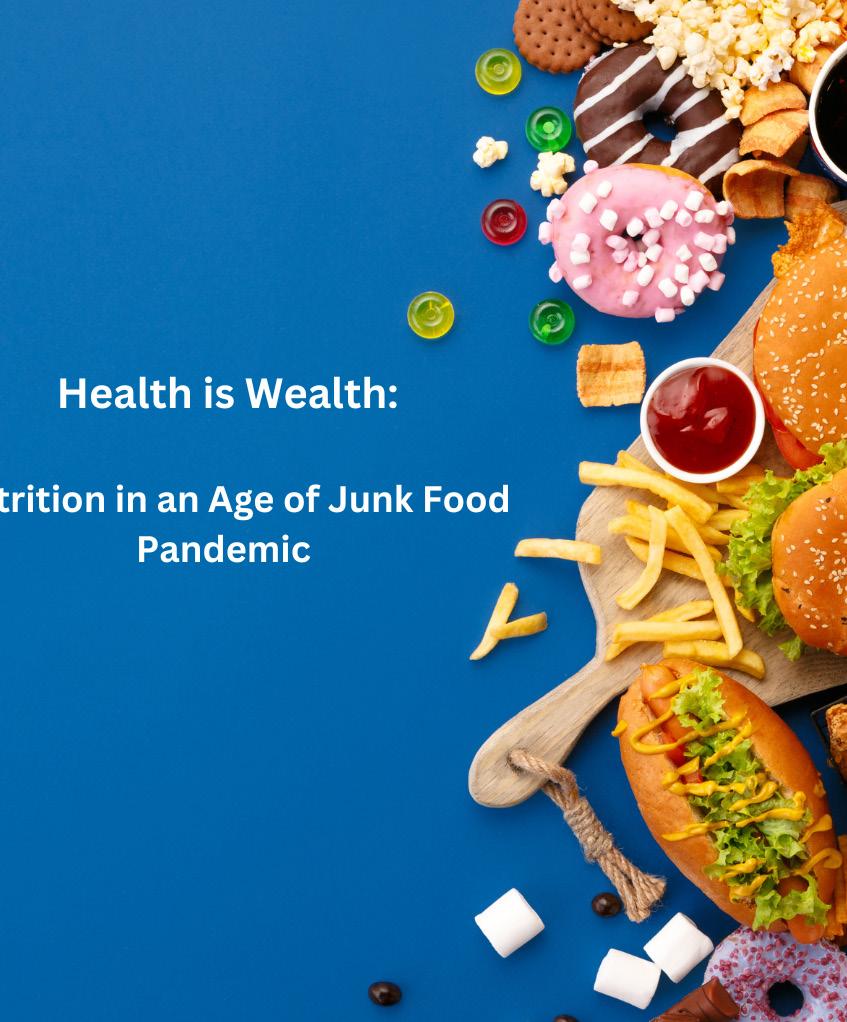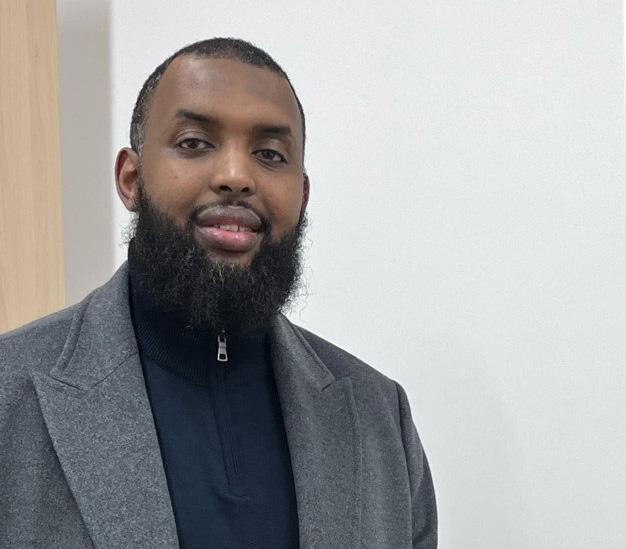
5 minute read
NUTRITION IN AN AGE OF JUNK FOOD PANDEMIC
By Mr. Nur Mohamed
The fact of existential indispensability of nutrition to human life begins from the earliest embryonic stages when the newly formed foetus attaches itself to the placenta for the sustenance of its life and further development. During pregnancy the amount of nutrition and balanced diet that the expectant mother consumes plays substantially a very significant role in the healthy development of the embryo till it becomes a fully formed baby ready to enter the world.
Advertisement
The need for nutrition is endless as the newly born baby’s first encounter with food, as its joins the human population, begins from the mother’s irreplaceable breast milk. Even the mother’s milk undergoes changes both qualitatively and quantitatively to suit the rapidly and continually growing needs of the baby.
Foods humans consume contain various types of nutrition with some having more of certain vitamins, proteins and minerals than others and vice versa. The more richly nutritious diets one regularly takes, the more beneficial they are to the person’s health and overall well-being. There are certain foods that not only are physically beneficial but also contribute to boosting the brain power of the individual. Clinical tests and scientific studies have shown that some foods do possess nerve-calming, energising, healing and therapeutic properties. People who maintain the consumption of healthy, balanced, wholesome diet are known to be less prone to developing serious medical complications or the tendency to falling sick so easily and are less dependent on medications. Among these foods are some that are known to slow even the aging process and other frailties that come with it. Children fed with wholesome, balanced and richly nutritious foods stand better chances of having their cognitive abilities developing remarkably well.
Conversely, in this age of living a fast-paced life saturated with so many distractions owing to the people addiction to their smart devices and prolonged accessing of the social media, people are having so less time or appetite for eating proper meals and are rather becoming so much, more inclined to eating fast foods on regular basis quite impervious and unaware to their lack of the proper nutrition and paying no heed to the required, daily intake in the amount of nutrition. Nowadays, it has become commonplace to see children in their early teens rushing to convenience stores to start their morning with energy drinks when in fact for their age they are expected to naturally be bursting with energies. The reason for their dependency on such drinks is owing to their consumption of fast foods.
To sum up, the mushrooming fast-food joints during this the junk food pandemic and the people’s over-dependence on them has to a greater extent contributed to the weakening of their immune systems, therefore rendering them easily susceptible to all kinds of illnesses thereby seeing exponential increase in the number of people needing either regular medications and/or hospitalisations which otherwise could have been avoided. This eventually not only overburdens the already crisis-ridden health sectors of many nations but also drains these nations’ coffers with its ripple effects potentially impacting other sectors.
Succinctly stated “Health is wealth” goes the famous saying, so anyone squandering it will do so to their own peril.
A Journey To Healing From Mental Health Problems
By Ladan Osman
People exposed to atrocity and persecution during an outbreak of war can induce longlasting trauma. Survivors often recall feeling a surge of overwhelming panic witnessing personal belongings destroyed. Dead bodies are scattered around on the ground.

Women and girls are screaming while being raped. But the effect on the cognitive, behavioural, and physiological processes are forgotten. Cumulative exposure to these incidences causes symptoms linked to post-traumatic stress disorder. Re-experiencing traumatic events, avoiding interactions, excessive arousal, and numb emotions.
These episodes are traces of war unveiled in the body. In addition, individuals develop other physical health problems and substance use. It profoundly affects marital intimacy, parent-child attachment bond and daily activity. Indeed, without healing the wounds of war increases, the probability of transmitting trauma to the offspring1. A phenomenon is known as intergenerational trauma1.
In the 1990s, refugees fleeing war-torn states arrived in the UK2. Here, they encountered folks from different ethnicities and foreign languages. So, naturally, they settled in communities inhabited by people from shared cultural practices to preserve their identity. Unfortunately, public estates in deprived neighbourhoods are poorly maintained and prone to violence.
The apartment often contains mould patches, deteriorated surfaces and loose floorboards, which adversely affect health. Transitioning into this new life can be stressful for parents to establish a healthy family unit. In addition, unresolved war trauma and upbringing methods inherited from the previous generation can produce chaotic and hostile homes.
On the condition that a primary caregiver cannot interpret and respond to a child’s distress, they tend to implement physical discipline and use harsh words. The child learns poor communication skills, so when they encounter academic and friendship issues, they cannot express themselves because of repercussions3. Silently, they make adjustments, but a lack of maturity hinders this process.
These environmental factors intertwine in a complex manner resulting in epigenetic modification. It impacts development, confidence and self-esteem. The body becomes hyper-vigilant, distorting the perception of danger. It increases the likelihood of limited capacity to differentiate between real and imagined threats. Regular brain activation of fight or flight response can be overwhelming to manage daily activities. Perhaps the child exhibits low mood, avoidance or misconduct.
Intergenerational trauma is not a specific diagnosis in the Diagnostic and Statistical Manual of Mental Disorders, Fifth Edition (DSM-5). Nonetheless, professionals acknowledge the existence of this phenomenon. Treatment options are available on the NHS, where people can access holistic and intense interventions delivered through individual, group and family therapy. It is essential to break intergenerational trauma to prevent onward transmission to following generations.
1. Mojatu: How would you describe being from ethnic minorities and in the coaching and personal development industry?
Counsellor: I describe being a counsellor as a trailblazer which means basically that it feels like I am one of the first to be a male, Somali counsellor. You know I must be a lot of stuff to a lot of people. On one side, I teach people what is all about, on the other side I am a counsellor for people, on the other I am kind like training people and more importantly fighting stigma as well. So, in many ways, I don’t have a (particular) platform to follow.

On top of that, when you look at it culturally and religiously there are so many aspects that involve counselling on mental health because mental health is life. You can’t separate mental health from life because what mental health means is emotionally and psychologically, physical wellbeing and connection to your loved ones, to your community and to society so if a person doesn’t have that the mental health deteriorates so you cannot separate all those aspects of the person from counselling and wellbeing. So, the best way I can call it or myself is a trailblazer.
2. Mojatu: How does your background relate with your career as counselling and mental health coach?
Counsellor: My background being a youth worker, working with communities in schools and in colleges, in prisons. This kind of helped in many ways to understand a lot more diversities and a lot more understanding of the issues that actually impact our community as an ethnic minority so in many ways when my clients are










